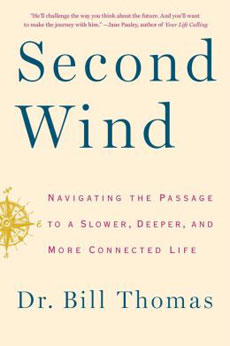"Most Americans would call positive aging an oxymoron and place it alongside perennial favorites such as enormously small, genuine fake, and military intelligence. Our society's pervasive and unrelenting bias against aging makes it hard to take terms like active retirement and healthy aging seriously. Nor do the words enthusiast and aging seem to belong together. But they do. Although they remain a small group hidden in the shadows of society, those who embrace aging are creating a subculture that has the temerity to celebrate the normal changes associated with life beyond adulthood. These are the Enthusiasts.
"Very few people are aware of this peculiar brand of enthusiasm, and even fewer can say that they know an Enthusiast personally. Indeed, the Enthusiast's perspective is so far removed from the conventional Denialist and Realist interpretations of aging that it remains nearly invisible. Enthusiasts aren't just willing, they are eager to explore life beyond adulthood because they believe this life phase contains far more developmental potential than adulthood. They want to take hold of aging and its opportunities with both hands and use them to further their own growth. Even though most people have never heard of them, Enthusiasts have already developed a rich self-descriptive language and a vibrant network of relationships and gatherings.
"During the first-ever conference on 'The Poetics of Aging,' Josiah Polhemus neatly summarized the Enthusiasts' creed: 'As I grow older, the outer world of appearance, prestige and perfection, all influences from outside sources, lessen; the inner world of imagination, gratitude and tolerance strengthen and keep me seeking wisdom and more breath.' Enthusiasts gleefully subvert, mock, and violate the doctrine of youth's perfection. Instead of accepting the idea that youth is best, they draw inspiration from people and cultures from around the world and throughout history who have seen virtue in age.
"The Book of Genesis reports that Adam lived nine hundred years. The remarkable longevity of biblical patriarchs was said to be a reward for their great piety. Leviticus 19:32 leaves no doubt about the value of age and requires the faithful to 'rise up before the hoary head, and honor the face of the old man.' Postwar Japan established a new holiday known as Respect for the Aged Day: the media lavishes attention on the lives of older people, and the occasion has become one of the busiest travel days of the year. In 1963 President Kennedy highlighted the connection between age and value:
" 'This increase in the life span and in the number of our senior citizens presents this Nation with increased opportunities; the opportunity to draw upon their skill and sagacity — and the opportunity to provide the respect and recognition they have earned. It is not enough for a great nation merely to have added new years to life — our objective must also be to add new life to those years.'
"Enthusiasts endorse Kennedy's vision of reciprocity, seeking good health not just for their own benefit but, more importantly, so that society can draw upon 'their skill and sagacity.' Perhaps most importantly, they recognize that human development is not, as so many insist, restricted to the young but continues across the life span. Norm Amundson summarizes the Enthusiasts' powerful urge to explore: 'Life is a story with many chapters, the most exciting segments usually come toward the end of the book.' The desire to outgrow adulthood is honorable, it is ancient, and in contemporary American society, it is also rare. We need to explore the undiscovered country of aging because there is also compelling evidence that we will find happiness there."
